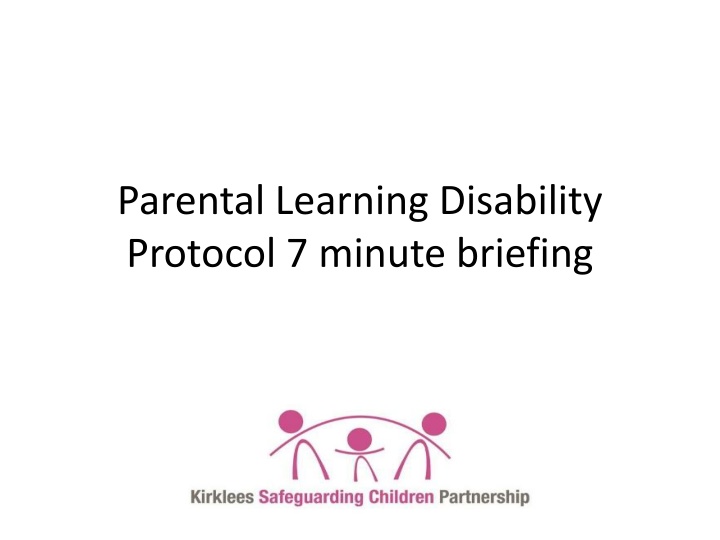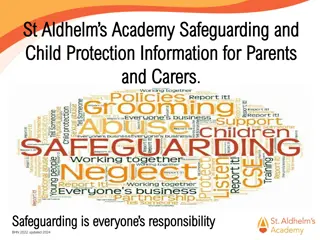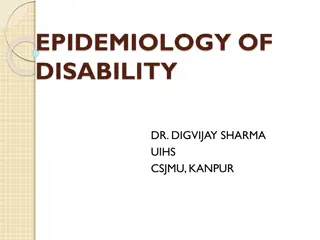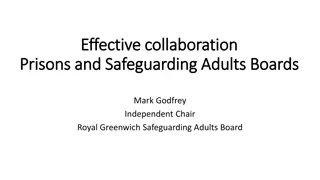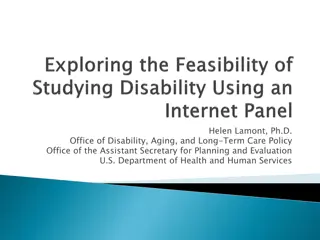Safeguarding Work with Parents for Whom Learning Disability is a Factor
Collaborative work between professionals and families plays a crucial role in safeguarding the wellbeing of children with parents facing learning disabilities. Learn about the protocol established by Kirklees Safeguarding Children Partnership agencies and the role of Community Learning Disability Teams in facilitating access to essential services for individuals with learning difficulties.
Download Presentation

Please find below an Image/Link to download the presentation.
The content on the website is provided AS IS for your information and personal use only. It may not be sold, licensed, or shared on other websites without obtaining consent from the author.If you encounter any issues during the download, it is possible that the publisher has removed the file from their server.
You are allowed to download the files provided on this website for personal or commercial use, subject to the condition that they are used lawfully. All files are the property of their respective owners.
The content on the website is provided AS IS for your information and personal use only. It may not be sold, licensed, or shared on other websites without obtaining consent from the author.
E N D
Presentation Transcript
Parental Learning Disability Protocol 7 minute briefing
Background Safeguarding work with parents for whom learning disability or learning difficulty is a factor, requires good collaborative work between professionals and family to ensure the wellbeing of children. These parents, in common with all parents, will need help and advice from specialists in parenting, such as school nurses, health visitors and midwives. The family and the parenting specialists themselves may both also need the help of the community learning disability teams, to ensure that the advice and support that is provided is appropriate and accessible.
Protocol A protocol has been agreed between Kirklees Safeguarding Children Partnership agencies, to ensure that collaborative work with the community learning disability teams takes place at an early stage in order to ensure that children s health and safety are safeguarded. The initial purpose of collaborative work between Community Learning Disability Team (CLDT) and other professionals is to facilitate the access of individuals with a Learning Difficulty or learning disability to universal services that are being provided by other agencies. The CLDT role is to provide other professionals with expert advice, about how information and services can be provided in a manner that is likely to be accessible to a person with a learning disability or difficulty, and to suggest assessment strategies which will help determine the impact of learning disability on current and future parenting capacity.
Community Learning Disability Team The community learning disability team is a multi agency team of professionals from a variety of disciplines, who work with individuals with a diagnosed learning disability. Professionals in this team include social workers, occupational therapists, physiotherapists, and nurses, who are based at Folly Hall Mills on St. Thomas Road in Huddersfield. Individuals who have an IQ of 70 or below qualify for help and support from these multi disciplinary teams. The teams do not provide parenting assessments, but are able to provide knowledge and expertise to support other professionals with their assessment and intervention work.
Consultation Request Form In order to access advice or support from a CLDT practitioner, there needs to be clear details provided by the professional who is seeking advice. This must be done through the completion of a Consultation Request form, which clearly identifies the factors which indicate a possible learning disability/difficulty. The form must also indicate how service delivery is being compromised by the perceived Learning Difficulty, and the areas where the professional is seeking help. The consent of the client for this professional consultation is not essential at this stage, but is preferable in order that professional work with the family is based on an open and honest dialogue. Wherever possible the view of the client should be expressed in this initial written contact with the CLDT. The Consultation Request form should be used to make this request can be found on the KSCP website under Information for Professionals / Protocols and must be sent directly to the teams at the Community Learning Disabilities Team, 3rd Floor, Folly Hall Small Mills, St Thomas's Road, Huddersfield, HD1 3LT. Telephone number: 01484 221000
Process The consultation request forms will be considered at the Community Learning Disability Team, and allocated to the professional who is on the rota for that week. That professional will make contact with the referrer and initiate a discussion with the referrer. It is important that a record is made of the actions that are agreed by both professionals, during the course of this discussion, and that it is also documented how evaluation work will subsequently take place, in order to evidence whether implementing the advice provided by the learning disability team has had any impact on parenting capacity. The CLDT practitioner will record their advice onto Care First under the name of the parent. Completion of the consultation request form is not a referral to CLDT and will not result in the allocation of a CLDT worker on a permanent or regular basis
What Next? West Yorkshire Safeguarding Children procedures must be followed, should assessment work indicate the presence of child protection concerns. Lack of progress when advice from the community learning disability team is implemented, may result from a number of factors that are unrelated to an individuals learning capacity, for example mental ill health or substance misuse may also be influential factors on individual capacity.
Implementing change What does this mean for your service? What steps can you take to publicise the use of this protocol?
KSCP Website - https://www.kirkleessafeguardingchildren.co.uk/ Twitter - @KirkleesLSCP Contact details 01484 225161
